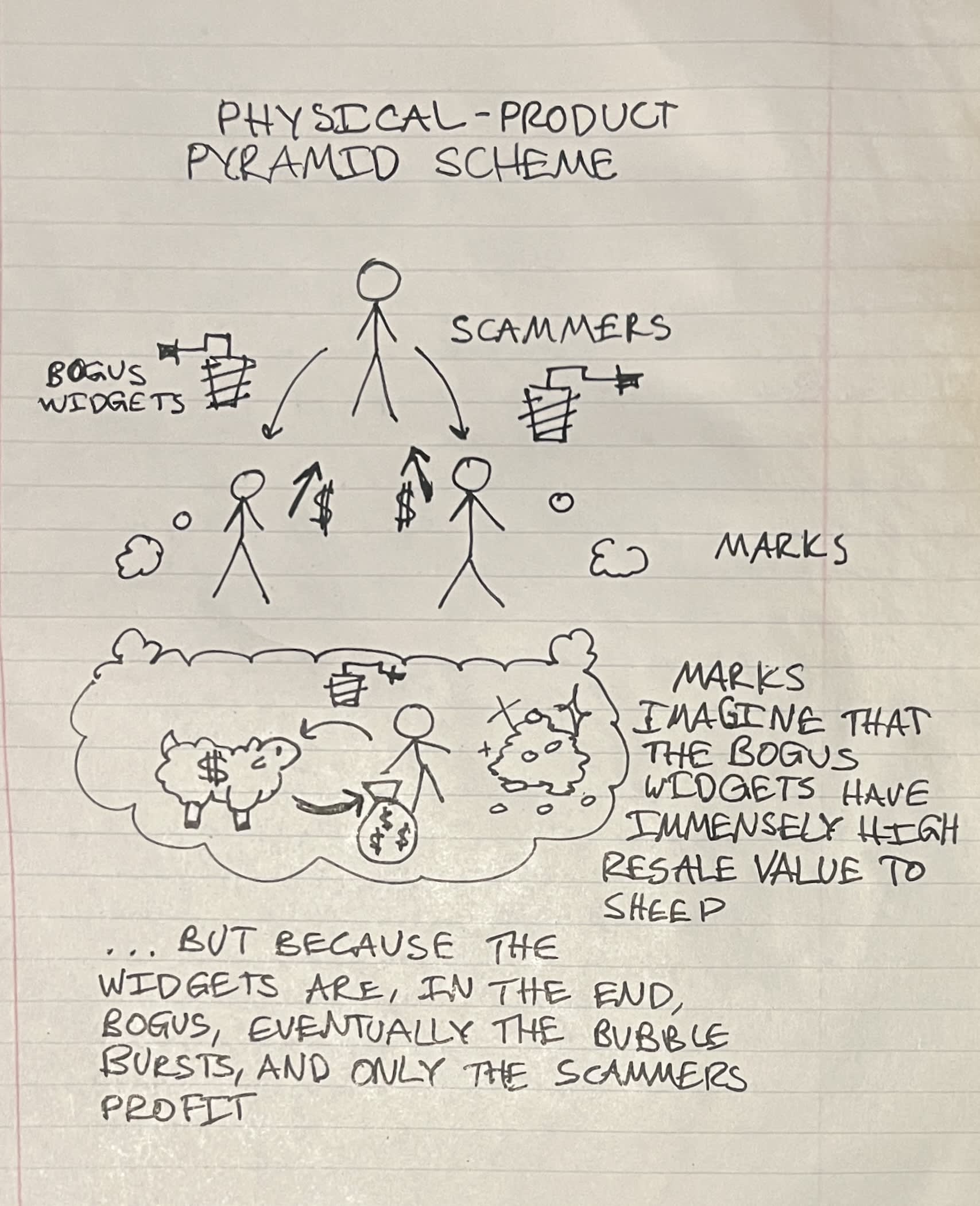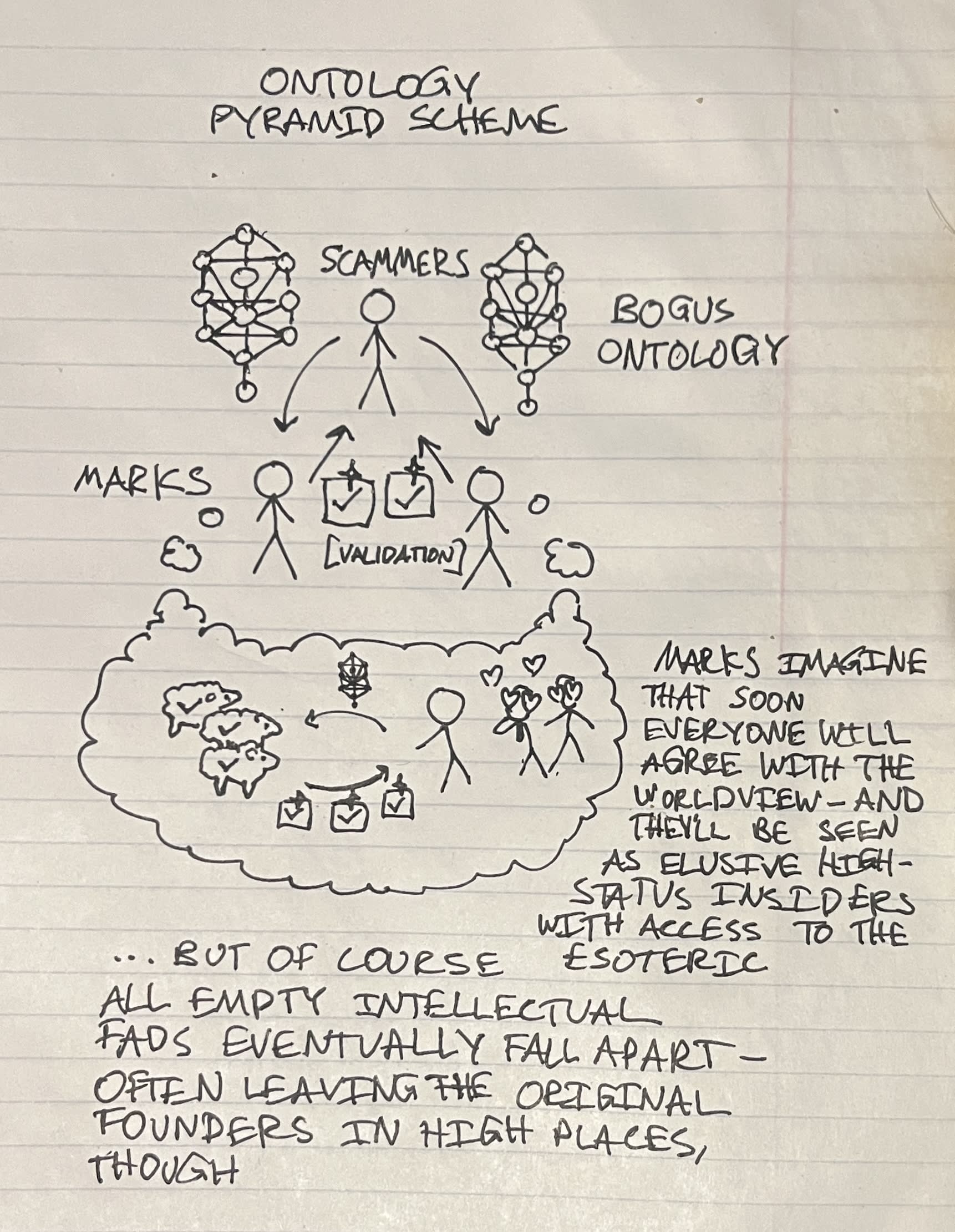Don't fall for ontology pyramid schemes
post by Lorec · 2025-01-07T23:29:46.935Z · LW · GW · 8 commentsContents
8 comments
Pyramid schemes work by ambiguating between selling a product, and selling shares in the profit from the sale of that product. It's a kind of sleight of hand that saves the shills from having to explicitly say "our company is valuable because other people think it's valuable", which might otherwise be too nakedly dishonest to work. Shills can pretend they're offering marks a profitable sales job for a company that makes a product so wonderful the sheep can't resist it, marks buy in and pretend to be buying product to be used when really they're basing their high bids on the value at which they hope the product can be sold, and thus a few scammers at the top can make the value of share in their enterprise appear to inflate arbitrarily.

A similar pattern of exploitation occurs in the market for ontologies, although without legible prices or transaction.
If beliefs don't pay rent, they shouldn't be allowed to linger [LW · GW]; the categories were made for man, not man for the categories. Just as you should decide which products to purchase based on how much value you expect to get out of using them directly, you should decide whether that big blue floppy thingy over there [LW · GW] is a 'beast' or a 'fish' [or something else entirely] based on how you expect this to assist your ability to think about reality [LW · GW] and draw true conclusions [LW · GW].
By default, when Jane Doe says "There are 4 components of personality - yellow bile, black bile, blood, and phlegm, and here's what they do" [or, alternatively, when Yamada Hanako says "there are 4 personality types corresponding to the 4 blood types, and here's what they are"], you will take her assertion and check it against your intuition, and possibly even go to the trouble of searching for concrete examples [ . . . and then counterexamples [LW · GW] ] in your remembered experience. And then you'll decide to accept it or reject it, as a rent-paying concept structure.
Realistically, just because you run on human psychology, your decision will have a lot to do with how you feel about this particular Jane Doe. But what won't matter is how much corroborating evidence she can bring in to support her lovely categorization schema, from within a community of theorists that [unlike you] already accepts it. You know movements based on mistakes of fact build up intricate internal systems of theory all the time. Hanako can show you pages and pages of impressive-looking diagrams, but if it doesn't seem to you like there are in fact 4 types of people, all having such-and-such traits based on so-and-so blood type, you'll shrug and say "Sorry, but that all just looks like hokum to me" [because it probably is].
There exists, however, a species of ontology evangelist which attempts to use the weight and magnificence of their community's pre-existing structures of theory to cow or dazzle people into buying in, and they often succeed. This is the equivalent of a physical-goods pyramid scheme: marks who buy an ontology from such a seller tell themselves their product is very valuable, but all they've really been convinced of is that the worldview has a sky-high resale value [or the seller has the market cornered], and all their friends will be conversing in this ontology soon anyway. When the empty intellectual fad inevitably runs its course, they'll end up dumbfounded, holding nothing but a pan of fool's gold, wondering what happened. They probably won't realize what happened is they never checked the appraised value of the asset against the ground truth: its object-level use-value.
Don't fall for these scammers! It's hard not to; they're everywhere. And they're often very practiced bullies, ready with a [measuredly] forceful reminder of how, if you choose to depart from their way of talking about things, you'll have no one to see eye to eye with anyway. That, of course, is a load of bullshit in the long term, because people converge on the truth.

Having said all that, if someone has an actual argument for why I should believe in the Five Factor model of personality, I'll be much abashed [but grateful!] to hear it.
8 comments
Comments sorted by top scores.
comment by Mitchell_Porter · 2025-01-08T03:12:05.103Z · LW(p) · GW(p)
Could you give some examples of ontology pyramid schemes?
Also, can ontologies that are actually true, be the subject of pyramid schemes, as you define them?
Replies from: Lorec↑ comment by Lorec · 2025-01-10T14:25:26.830Z · LW(p) · GW(p)
To your first question:
I honestly think it would be imprudent of me to give more examples of [what I think are] ontology pyramid schemes; readers would either parse them as laughable foibles of the outgroup, and thus write off my meta-level point as trivial, or feel aggressed and compelled to marshal soldiers against my meta-level point to dispute a perceived object-level attack on their ingroup's beliefs.
I think [something like] this [implicit] reasoning is likely why the Sequences are around as sparse as this post is on examples, and I think it's wise that they were written that way.
To your second:
There's nothing logically against an ontology that's true being the subject of a pyramid scheme, any more than there's anything logically against the bogus widgets a physical pyramid scheme is selling, actually being inordinately useful. It just generally doesn't happen.
comment by LVSN · 2025-01-08T09:05:17.953Z · LW(p) · GW(p)
FFM is great except for two things:
- it purports to measure conscientiousness, and it measures that by how much money you make and how often you work, which have nothing to do with acting according to your conscience in a world where the highest-relevance acts are speech-acts
- its 'agreeableness' metric is supposed to be about niceness and harmony-making, but people who reveal their disagreements for the sake of resolving them get sorted as argumentative and thus low in agreeability, and there's no separate metric for niceness in the model, so as a worldview FFM basically says you're either dogmatically conformist or a jerk
Which is actually a lot of things wrong with it, considering that's two of its five factors.
Replies from: Viliam, AspiringRationalist↑ comment by Viliam · 2025-01-19T20:56:59.306Z · LW(p) · GW(p)
I guess that's what you inevitably get when you compress everything into five major buckets. Some buckets end up containing more than one thing. But the way the bucket were constructed means that those things are highly correlated in population. Like, not everyone is necessarily "either dogmatically conformist or a jerk", but frankly, there are many people out there who can uncontroversially be placed on this scale.
You can go into more detail and split the big five traits into subtraits. Some people already do that. I couldn't find an authoritative source, so I asked an LLM, and here is its answer:
Openness to Experience (O) = imagination, creativity, and curiosity.
- Imagination – Vivid fantasy life and creativity.
- Artistic Interests – Appreciation for beauty and art.
- Emotionality – Awareness of one’s emotions.
- Adventurousness – Willingness to try new experiences.
- Intellect – Interest in abstract ideas and complex thinking.
- Liberalism – Willingness to challenge traditions and authority.
Conscientiousness (C) = self-discipline, organization, and responsibility.
- Self-Efficacy – Confidence in one’s abilities.
- Orderliness – Preference for organization and structure.
- Dutifulness – Strong sense of obligation and responsibility.
- Achievement-Striving – Motivation to reach goals.
- Self-Discipline – Ability to persist with tasks.
- Cautiousness – Thinking before acting.
Extraversion (E) = sociability, enthusiasm, and assertiveness.
- Friendliness – Warmth and approachability.
- Gregariousness – Enjoyment of social gatherings.
- Assertiveness – Tendency to take charge.
- Activity Level – Preference for high energy and action.
- Excitement-Seeking – Desire for thrills.
- Cheerfulness – General positive emotions.
Agreeableness (A) = warmth, compassion, and cooperation.
- Trust – Belief in the honesty of others.
- Morality – Sincerity and lack of manipulation.
- Altruism – Willingness to help others.
- Cooperation – Avoidance of conflict.
- Modesty – Humility and lack of arrogance.
- Sympathy – Empathy and concern for others.
Neuroticism (N) = emotional instability and tendency toward negative emotions.
- Anxiety – Tendency to worry.
- Anger – Proneness to frustration.
- Depression – Tendency toward sadness.
- Self-Consciousness – Sensitivity to embarrassment.
- Immoderation – Difficulty resisting urges.
- Vulnerability – Struggles under stress.
↑ comment by NoSignalNoNoise (AspiringRationalist) · 2025-01-09T05:51:06.289Z · LW(p) · GW(p)
Are those genuine flaws with the model, or is the terminology just suboptimal? Put another way, if you know someone's 5 factor conscientiousness and agreeableness scores, how useful is that for predicting their behavior?
comment by Donald Hobson (donald-hobson) · 2025-01-08T12:24:06.762Z · LW(p) · GW(p)
Imagine a medical system that categorizes diseases as hot/cold/wet/dry.
This doesn't deeply describe the structure of a disease. But if a patient is described as "wet", then it's likely some orifice is producing lots of fluid, and a box of tissues might be handy. If a patient is described as "hot", then maybe they have some sort of rash or inflammation that would make a cold pack useful.
It is, at best, a very lossy compression of the superficial symptoms. But it still carries non-zero information. There are some medications that a modern doctor might commonly use on "wet" patients, but only rarely used on "dry" patients or visa versa.
It is at least more useful information than someones star sign, in a medical context.
Old alchemical air/water/fire/earth systems are also like this. "air-ish" substances tend to have a lower density.
These sort of systems are a rough attempt at a principle component analysis on the superficial characteristics.
And the Five Factor model of personality is another example of such a system.
Replies from: karl-krueger, Lorec↑ comment by Karl Krueger (karl-krueger) · 2025-01-11T21:41:20.714Z · LW(p) · GW(p)
If 90% of the conditions you ever have to treat are fever, hypothermia, runny noses, and dehydration, then I imagine hot/cold/wet/dry will get you pretty far.
(Runny nose? Here, take some drying herbs, and try not to sneeze on other people. Feverish? Bathe in cool water and take these cooling herbs. Losing water due to dysentery? Drink clean water with salt. Fell in the icy lake? Here, have a thermal support puppy.)
↑ comment by Lorec · 2025-01-10T15:22:31.625Z · LW(p) · GW(p)
Relevant to whether the hot/cold/wet/dry system is a good or a bad idea, from our perspective, is that doctors don't currently use people's star signs for diagnosis. Bogus ontologies can be identified by how they promise to usefully replace more detailed levels of description - i.e., provide a useful abstraction that carves reality at the joints - and yet don't actually do this, from the standpoint of the cultures they're being sold to.